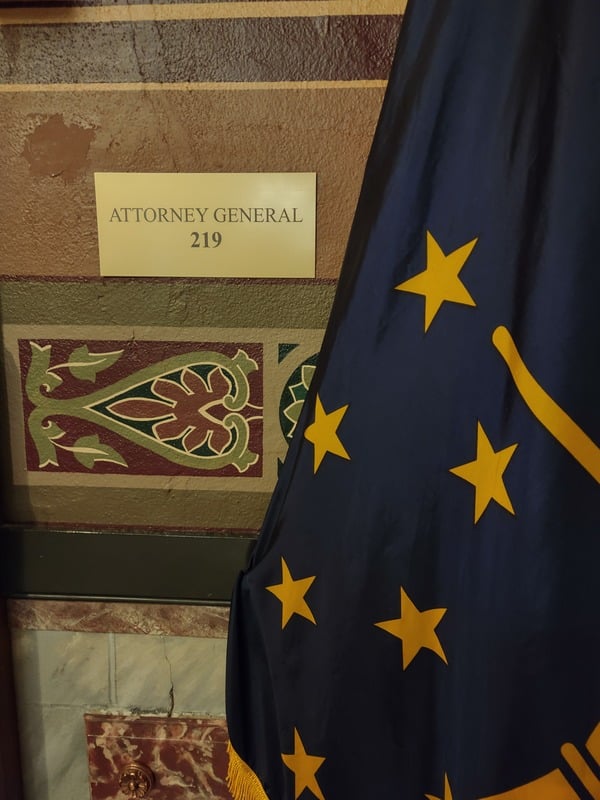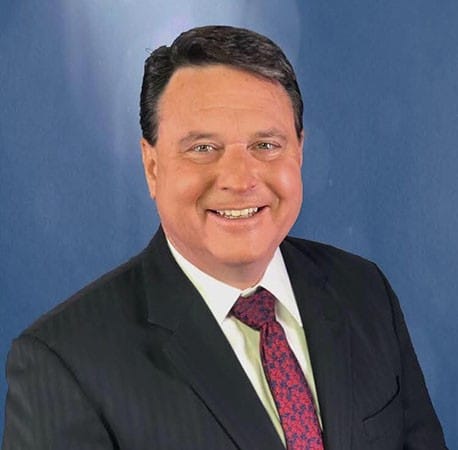
By Marilyn Odendahl
The Indiana Citizen
August 19, 2025
In his answer to the second disciplinary complaint lodged against him, Indiana Attorney General Todd Rokita is denying he contradicted sworn statements to the Indiana Supreme Court and is distancing himself from the press release that ignited the second investigation into his professional conduct.
The Indiana Supreme Court Disciplinary Commission has charged Rokita with violating three attorney professional conduct rules when he issued a press release following the public reprimand he received in November 2023. In its complaint, the disciplinary commission accused the attorney general of making false statements, engaging in dishonest behavior and misrepresenting that he accepted responsibility for his previous misconduct, and issuing a statement to the press that contradicted the statements he made in the conditional agreement and affidavit that settled his first disciplinary case.
Rokita has denied all three allegations and said, in his answer to the complaint, the press release was “true and accurate.” Also, he hinted at the First Amendment argument he has been making since the second disciplinary investigation was launched.
“Attorney General Rokita’s public statements did not contradict the Conditional Agreement or Affidavit,” Rokita’s answer in In the Matter of Theodore Edward Rokita, 25S-DI-29, said. “Further, the Disciplinary Commission’s Complaint infringes on Attorney General Rokita’s First Amendment free speech rights, violates Indiana’s separation of powers principles, and violates Indiana’s anti-SLAPP statutes.”
Now the case could proceed to a hearing or the parties could negotiate a settlement. Ultimately, the Supreme Court will determine whether a sanction, which could range from a private reprimand to disbarment, would be imposed on the state’s top lawyer.

Rokita had tried to get the complaint dismissed, asserting the commission’s action was unlawful. In the motion to dismiss, he argued the complaint was the commission’s “impermissible attempt to restrain an elected official and candidate’s political speech,” and retaliation for the “common-sense reforms to the disciplinary process” he had proposed.
In his answer, Rokita also renewed his request for the disciplinary case to be dismissed and asked that the disciplinary commission pay all costs.
A unanimous Supreme Court denied Rokita’s previous motion to dismiss. However, the court did grant the attorney general’s request to appoint a three-judge panel to preside over his case, rather than the typical single hearing officer, if it proceeds to a hearing. Also, in an unusual move, the court encouraged the parties to meet and try to reach a settlement.
A negotiated settlement is how the first disciplinary complaint filed against Rokita was resolved.
The attorney general was charged in 2023 with violating the professional rules of conduct for speaking publicly about his office’s investigation into Dr. Caitlin Bernard, an Indianapolis OB/GYN. Bernard had performed a medication abortion on a 10-year-old rape victim from Ohio and amid the media firestorm that erupted afterward, Rokita appeared on Fox News on July 13, 2022, calling her an “abortion activist acting as a doctor” and alleging she had failed to file the required reports about completed abortions with the state health department.
Subsequently, Rokita, represented by Schaerr Jaffe, a law firm based in Washington, D.C., reached a conditional agreement with the disciplinary commission. He agreed he had violated two rules of professional conduct by making statements about Bernard’s character, credibility or reputation for no other purpose than to embarrass or burden her.
A slim majority of the Supreme Court accepted the conditional agreement, which included the punishment of a public reprimand. After the court issued its order, Rokita released a combative statement, saying, in part, he was found not to have violated any laws and that he had evidence and an explanation to fight the charges, but he said he had to sign the affidavit without making any modifications.
Rokita’s post-reprimand statement motivated two attorneys to file grievances, alleging his remarks show he made false statements to the Supreme Court. Those grievances led to an investigation, which resulted in this second disciplinary complaint. In his answer to the charges, Rokita, a Republican, took a swipe at the two lawyers.
“Respondent admits that Democrat activists filed complaints against him for politically motivated reasons,” Rokita stated in his answer filed Aug. 15. “Respondent denies ethical misconduct or that he was dishonest with the Court in the statements made in the November 2, 2023, press release.”
As part of its investigation into this matter, the commission focused on the creation of Rokita’s statement released after the reprimand, reviewing drafts and edits of the press release that circulated across the attorney general’s desk as well as the communications discussing the content and revisions.
In his answer to the new charges, Rokita seemed to dispute his level of involvement in writing the statement. Three times, Rokita said he denied “any insinuation that he expressly approved all materials contained in the various drafts of the press release.” Also, he stated twice that multiple individuals were involved in the process of drafting and editing the statement.
After the Supreme Court issued the public reprimand and Rokita released his statement, media outlets and private citizens began asking questions about the inconsistencies between the press release and his signed affidavit that was referenced in the court’s opinion. The disciplinary commission then petitioned the Supreme Court and the documents, normally kept confidential, were released to the public.
Rokita affirmed in his answer the disciplinary commission’s actions, but then he hit back. He said he admitted “that the Disciplinary Commission filed a Verified Petition Requesting Conditional Agreement for Discipline and Affidavit Be Released for Public Access, despite the rules requiring that the Conditional Agreement and Affidavit remain confidential.”
Rokita omitted from his answer that he had told the Supreme Court he did not object to the release of the documents. Moreover, he pressed the court to either make all of the materials in his first disciplinary case accessible to the public or keep everything confidential. In that response to the commission’s petition seeking the release of the documents, Rokita slapped the secretive nature of the disciplinary process. He asserted, “the public can benefit from observing the deliberations of (the disciplinary commission) that is not elected and never has meetings open to the Public.”
Former federal Magistrate Judge William Hussmann Jr., one of the three judges the Supreme Court has appointed to hear Rokita’s case, filed a disclosure acknowledging he had interacted in the past with individuals connected to the disciplinary matters.
In particular, Hussmann told the court he had some contact with Donald Lundberg, former chief legal counsel and executive director of the disciplinary commission, and Lauren Robel, former dean of Indiana University Maurer School of Law, who, in the summer of 2022, publicly called for the disciplinary commission to investigate Rokita’s actions toward Bernard.
Hussmann also noted Indianapolis attorney William Groth, who has filed disciplinary complaints against Rokita, had appeared as counsel in his court. However, Hussmann said he never had any communication with Groth about this disciplinary matter.
In addition, Hussmann revealed that during his tenure as a magistrate judge, he had been assigned to work on some cases over which now-retired federal Judge John Tinder was presiding. In the summer of 2022, Tinder and former Indiana Rep. Susan Brooks, a Republican, co-wrote an op-ed for The Wall Street Journal condemning Rokita’s attacks on Bernard.
Maintaining that he has never had any discussions with Tinder about Rokita’s disciplinary cases, Hussmann said in his disclosure, “I believe I can evaluate any testimony from Judge Tinder in a manner that is fair and impartial to both parties to this case.”
Dwight Adams, an editor and writer based in Indianapolis, edited this article. He is a former content editor, copy editor and digital producer at The Indianapolis Star and IndyStar.com, and worked as a planner for other newspapers, including the Louisville Courier Journal.
The Indiana Citizen is a nonpartisan, nonprofit platform dedicated to increasing the number of informed and engaged Hoosier citizens. We are operated by the Indiana Citizen Education Foundation, Inc., a 501(c)(3) public charity. For questions about the story, contact Marilyn Odendahl at marilyn.odendahl@indianacitizen.org.